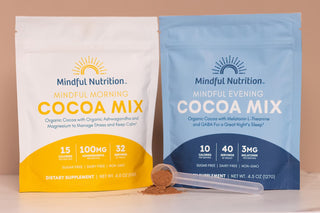It seems like the battle against sugar is endless! Luckily, natural sweeteners and sugar alternatives may help you satisfy your sweet tooth without consuming sugar itself.
So, let's go over the 5 best sugar substitutes if you want to sweeten your morning beverage.
At a Glance
- Stevia: A plant-based sweetener with zero calories
- Erythritol: A low-calorie sweetener that tastes very much like sugar
- Xylitol: Even your teeth can't say "no" to this sweetener
- Monk fruit: An alternative to refined sugar with antioxidants
- Honey: Contains vitamins, minerals, and deliciousness
See Related: Melatonin for Kids: Is Melatonin a Safe Sleep Aid for Kids?
#1. Stevia: A Plant-Based Sweetener

What makes sugar-free drinks sweet? Sugar isn't the only sweetener out there!
You may think that sugar is the cream of the crop when it comes to actual sweetness. However, you thought wrong!
In fact, stevia is hundreds of times sweeter than sugar, so a little bit goes a long way.
Don't know what stevia is? No worries - we've got you. Stevia is a low-calorie and plant-based sweetener that comes from the Stevia rebaudiana plant. The leaves of this plant contain a variety of compounds, including stevioside and rebaudioside A, which are hundreds of times sweeter than sugar.
Aren't yet convinced? Stevia isn't only ultra-sweet and plant-based, but it also carries a plethora of potential benefits:
- Calorie-free: It's hard to imagine that there's such a thing as a low-calorie sweetener, right? Surprisingly, stevia has zero calories, making it an ideal way to sweeten foods, baked goods, drinks, and snacks without increasing your calorie intake.
- Maintained energy: Sugar is known for fluctuating energy levels. Luckily, stevia doesn't come with that downside.
#2. Erythritol: The Long-Lost Cousin of Sugar
One of the issues with sugar substitutes or artificial sweeteners is that they don't taste exactly like sugar. While this isn't a dealbreaker for many, for some, it may make it challenging to give up sugar for good. That's where erythritol steps in!
Erythritol is a sugar alcohol found naturally in fruits and fermented foods. It has a low glycemic index and has a taste, texture, and sweetness similar to sugar.
Bonus: 6 Natural Sleep Aids for Better Sleep in 2025
#3. Xylitol: A Sweetener for Your Teeth and Tastebuds

Xylitol, pronounced zai-luh-taal, steps up where sugar falls short.
Though your teeth may shy away from sweet candies and sugary treats, they have nothing against xylitol! Xylitol is a sugar alcohol with potential dental benefits, and studies show it may reduce the risk of cavities.
Just keep in mind that xylitol is beneficial in moderation but toxic to dogs!
#4. Monk Fruit: A Sugar Alternative That Contains Antioxidants
Derived from Luo Han Guo, monk fruit is a sweetener known for its low calories and low glycemic index. Additionally, it contains compounds that have other potential benefits.
All in all, monk fruit is an excellent alternative to refined sugar or processed sugar.
#5. Honey: Yum!

Sugar - it's so sweet yet so sneaky! So, when you're ready to finally put your sugar back on the shelf, honey may save the day.
Raw honey, maple syrup, or agave nectar are all delicious and beneficial, making them the ideal substitute for sugar. Plus, they contain compounds like antioxidants, vitamins, and minerals.
The Bottom Line
These alternative sweeteners make it easy and enjoyable to maintain your lifestyle habits. Whether you're avoiding added calories or seeking low-calorie sweeteners, swapping sugar for stevia (or any of the other sugar substitutes on this list) may be a good choice.
Though table sugar is okay in moderation, try not to have it every day. That's why we use stevia extract in our collection of hot cocoa mixes.
Take a moment to stir, sip, and enjoy, feeling the flavor and aroma of your hot chocolate soothe your senses and relax your body.
You deserve to enjoy a warm beverage without worrying about the impact of sugar. Let us help you in your journey!
Keep Reading: The Surprising Health Benefits of Drinking Hot Chocolate

People Also Ask
What Is a Good Alternative to Sugar?
Natural sweeteners like stevia, monk fruit, honey, or maple syrup are all tasty alternatives to sugar.
You may even use fruits like bananas, dates, or apples as natural sweeteners in baking.
What Sugar Substitute Tastes Closest to Real Sugar?
The thing with sugar substitutes is that they're not sugar. That means they may have a unique flavor or a mild aftertaste.
However, most sugar substitutes do taste similar to sugar - after all, that's why they're considered a sugar substitute!
Which Is Better, Splenda or Stevia?
What is "better" depends on what you're looking for!
Want something that undergoes minimal processing, comes from a natural origin, and has some potential benefits? Go with stevia!
If you want something with a sugar-like taste, go with Splenda (although some studies suggest that Splenda may have effects on glucose and insulin levels).
--
Mindful Nutrition is a veteran-owned company with a passion for wellness. We use natural ingredients in our products, including melatonin, GABA, ashwagandha, and L-Theanine. Our hot cocoa blends are vegan, non-GMO, and plant-based, crafted to be a comforting addition to your daily ritual. We utilize third-party testing on all products to ensure purity, quality, and safety. To stay connected and learn more, follow us on Facebook, Instagram, and LinkedIn.
--
These statements have not been evaluated by the Food and Drug Administration. Our products are not intended to diagnose, treat, cure, or prevent any disease. The content on this website is for informational purposes only and is not intended as a substitute for advice from your physician or other healthcare professional. Always consult with a qualified healthcare provider regarding any medical condition or health concerns.















